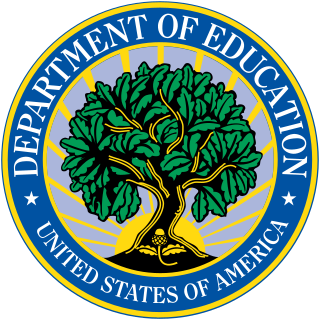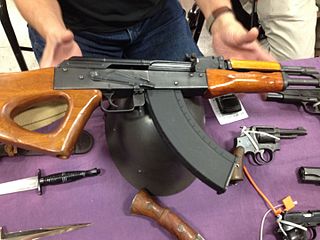Related Research Articles

The Federal Bureau of Investigation (FBI) is the domestic intelligence and security service of the United States and its principal federal law enforcement agency. Operating under the jurisdiction of the United States Department of Justice, the FBI is also a member of the U.S. Intelligence Community and reports to both the Attorney General and the Director of National Intelligence. A leading U.S. counter-terrorism, counterintelligence, and criminal investigative organization, the FBI has jurisdiction over violations of more than 200 categories of federal crimes.

The inch is a unit of length in the British imperial and the United States customary systems of measurement. It is equal to 1/36 yard or 1/12 of a foot. Derived from the Roman uncia ("twelfth"), the word inch is also sometimes used to translate similar units in other measurement systems, usually understood as deriving from the width of the human thumb.
The National Institute of Standards and Technology (NIST) is a physical sciences laboratory and non-regulatory agency of the United States Department of Commerce. Its mission is to promote American innovation and industrial competitiveness. NIST's activities are organized into laboratory programs that include nanoscale science and technology, engineering, information technology, neutron research, material measurement, and physical measurement. From 1901 to 1988, the agency was named the National Bureau of Standards.

The United States Department of State (DOS), or State Department, is an executive department of the U.S. federal government responsible for the nation's foreign policy and foreign relations. Equivalent to the ministry of foreign affairs of other nations, its primary duties are advising the U.S. president, administering diplomatic missions, negotiating international treaties and agreements, and representing the U.S. at the United Nations. The department is headquartered in the Harry S Truman Building, a few blocks from the White House, in the Foggy Bottom neighborhood of Washington, D.C.; "Foggy Bottom" is thus sometimes used as a metonym.

Alamosa is a home rule municipality and the county seat of Alamosa County, Colorado, United States. The city population was 9,806 at the 2020 United States Census. The city is the commercial center of the San Luis Valley in south-central Colorado, and is the home of Adams State University.

The United States Department of Commerce is an executive department of the U.S. federal government concerned with creating the conditions for economic growth and opportunity. Among its tasks are gathering economic and demographic data for business and government decision making, and helping to set industrial standards. Its main purpose is to create jobs, promote economic growth, encourage sustainable development and block harmful trade practices of other nations. It is headed by the Secretary of Commerce, who reports directly to the President of the United States and is a member of the president's Cabinet. The Department of Commerce is headquartered in the Herbert C. Hoover Building in Washington, DC.

The United States Department of Education is a Cabinet-level department of the United States government. It began operating on May 4, 1980, having been created after the Department of Health, Education, and Welfare was split into the Department of Education and the Department of Health and Human Services by the Department of Education Organization Act, which President Jimmy Carter signed into law on October 17, 1979.
The Network Information Center (NIC), also known as InterNIC from 1993 until 1998, was the organization primarily responsible for Domain Name System (DNS) domain name allocations and X.500 directory services. From its inception in 1972 until October 1, 1991, it was run by the Stanford Research Institute, now known as SRI International, and led by Jake Feinler. From October 1991 until September 18, 1998, it was run by Network Solutions. Thereafter, the responsibility was assumed by the Internet Corporation for Assigned Names and Numbers (ICANN).

The Brady Handgun Violence Prevention Act, often referred to as the Brady Act or the Brady Bill, is an Act of the United States Congress that mandated federal background checks on firearm purchasers in the United States, and imposed a five-day waiting period on purchases, until the National Instant Criminal Background Check System (NICS) was implemented in 1998. The act was appended to the end of Section 922 of title 18, United States Code. The intention of the act was to prevent persons with previous serious convictions from purchasing firearms.

The Alcohol and Tobacco Tax and Trade Bureau, statutorily named the Tax and Trade Bureau and frequently shortened to TTB, is a bureau of the United States Department of the Treasury, which regulates and collects taxes on trade and imports of alcohol, tobacco, and firearms within the United States.

The National Crime Information Center (NCIC) is the United States' central database for tracking crime-related information. The NCIC has been an information sharing tool since 1967. It is maintained by the Criminal Justice Information Services Division (CJIS) of the Federal Bureau of Investigation (FBI) and is interlinked with federal, tribal, state, and local agencies and offices.
OTC Markets Group is an American financial market providing price and liquidity information for almost 10,000 over-the-counter (OTC) securities. The group has its headquarters in New York City. OTC-traded securities are organized into three markets to inform investors of opportunities and risks: OTCQX, OTCQB and Pink.

The National Instant Criminal Background Check System (NICS) is a background check system in the United States created by the Brady Handgun Violence Prevention Act of 1993 to prevent firearm sales to people prohibited under the Act. The system was launched by the Federal Bureau of Investigation (FBI) in 1998. Under the system, firearm dealers, manufacturers or importers who hold a Federal Firearms License (FFL) are required to undertake a NICS background check on prospective buyers before transferring a firearm. The NICS is not a gun registry, but is a list of persons prohibited from owning or possessing a firearm. The buyer’s details are discarded after the query and a record on NICS of the firearm purchase is not made, though the seller as a FFL holder is required to keep a record of the transaction.

Gun show loophole is a political term in the United States referring to the sale of firearms by private sellers, including those done at gun shows, that do not require the seller to conduct a federal background check of the buyer. This is also called the private sale exemption. Under federal law, any person may sell a firearm to a federally unlicensed resident of the state where they reside, as long as they do not know or have reasonable cause to believe that the person is prohibited from receiving or possessing firearms.
The Office of the Controller General of Patents, Designs and Trade Marks(CGPDTM) generally known as the Indian Patent Office, is an agency under the Department for Promotion of Industry and Internal Trade which administers the Indian law of Patents, Designs and Trade Marks.

The Department of Agriculture is the executive department of the Philippine government responsible for the promotion of agricultural and fisheries development and growth. It has its headquarters at Elliptical Road corner Visayas Avenue, Diliman, Quezon City.

Americans are the citizens and nationals of the United States of America. Although direct citizens and nationals make up the majority of Americans, many dual citizens, expatriates, and permanent residents could also legally claim American nationality. The United States is home to people of many racial and ethnic origins; consequently, American culture and law do not equate nationality with race or ethnicity, but with citizenship and an oath of permanent allegiance.
Iran is a member of the WIPO since 2001 and has acceded to several WIPO intellectual property treaties. Iran joined the Convention for the Protection of Industrial Property in 1959. In December 2003 Iran became a party to the Madrid Agreement and the Madrid Protocol for the International Registration of Marks. In 2005 Iran joined the Lisbon Agreement for the Protection of Appellations of Origin and their International Registration, which ensures the protection of geographical names associated with products. As at February 2008 Iran had yet to accede to The Hague Agreement for the Protection of Industrial Designs.
The international yard and pound are two units of measurement that were the subject of an agreement among representatives of six nations signed on 1 July 1959; the United States, United Kingdom, Canada, Australia, New Zealand, and South Africa. The agreement defined the yard as exactly 0.9144 meters and the (avoirdupois) pound as exactly 0.45359237 kilograms.
References
- 1 2 3 4 "National Inventors Council Files" (PDF). National Archives & Records Administration. September 17, 2009. Retrieved August 18, 2012.
- ↑ Cavicchi, Prof. John. "The Mystery of the the[sic] Classified and Missing National Inventors Council (NIC) Files". University of New Hampshire School of Law via IP Mall. Archived from the original on May 22, 2011. Retrieved August 18, 2012.